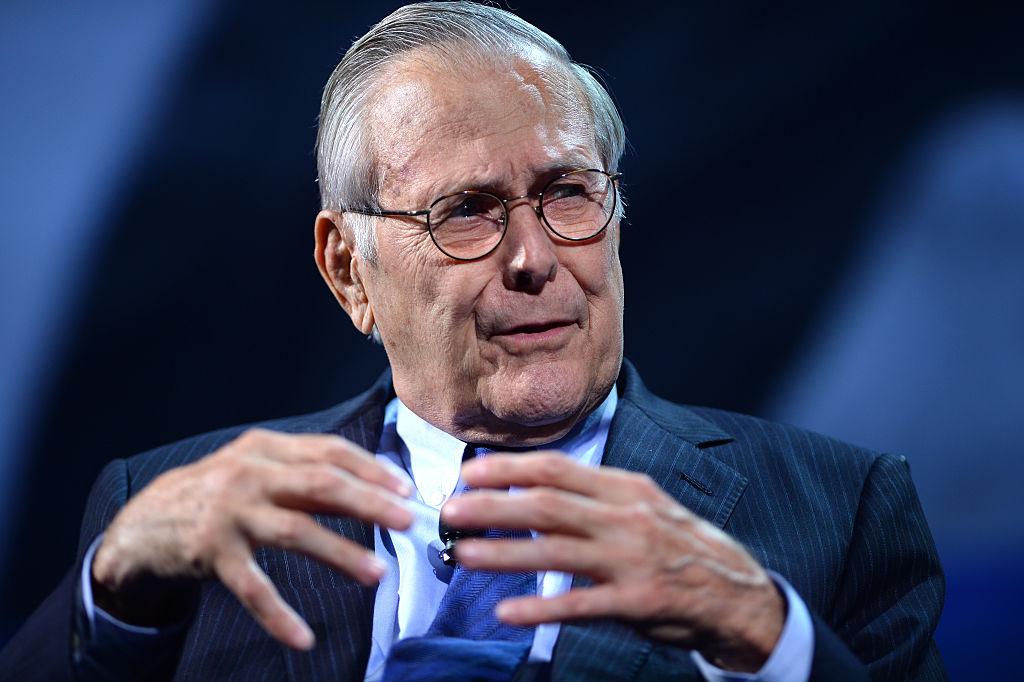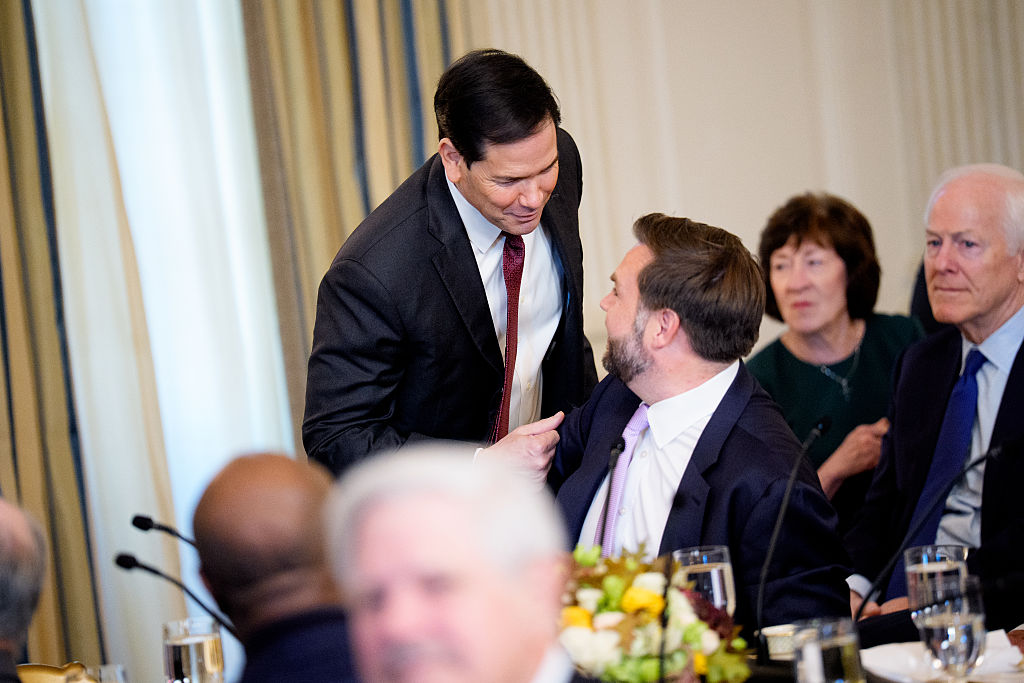Donald Rumsfeld died this week — and it’s just so easy, isn’t it? It’s so convenient to dance on the grave of the man who helped bring about the disastrous Iraq war. For Rumsfeld, the old dictum, de mortuis nihil nisi bonum, seems to have been discarded almost from the start. The obituaries, mostly in left-leaning publications like the Atlantic and the Daily Beast, have been downright vicious.
Rumsfeld was George W. Bush’s first defense secretary who, alongside Dick Cheney, pushed hard for deposing Saddam Hussein after 9/11. Because of this, he’s been labeled a war criminal. He’s been held responsible for hundreds of thousands of deaths, both in Iraq and in Afghanistan where he refused to accept a Taliban surrender. He’s been portrayed as a smug and pushy sumbitch who ran roughshod over sensible objections to war. The Bush administration’s torture program is said to be on his conscience.
All of this happens to be true. More than a warrior, Rumsfeld was a bureaucratic specialist who understood how to win interagency dogfights. It was that granular knowledge of government, combined with an ideologically informed hatred of Saddam Hussein, that allowed him and Dick Cheney to tag-team the war skeptics inside the Bush administration back in 2002 and 2003. So hell-bent was Rumsfeld on destroying Saddam that he set up an intelligence chop shop inside the Pentagon, euphemistically titled the Office of Special Plans, to counter CIA intel that contradicted the case for invasion. Anyone deemed insufficiently ablaze with war fever faced his wrath: Condi Rice was a ‘glorified Russian studies graduate student’; the French and Germans were ‘old Europe’.
A foe of red tape and antediluvian thinking, Rumsfeld wanted to make the military fleeter, simpler, nimbler. He believed this ‘light footprint’ could win in Iraq — and when outgoing Army chief of staff Eric Shinseki contradicted him and told Congress the operation would require many hundreds of thousands of troops, Rumsfeld quickly sidelined him. Rummy, as he was known, gambled everything on this cheap and swift approach: invade, shock and awe, hand over the country, get out. When it didn’t pan out, when Iraq went to hell and IED flames tore through the hazy air, the press turned on him. He retired in 2006. His reputation never recovered, and rightly so.
This is the story of Donald Rumsfeld — and admittedly it’s the same story that the bilious obituaries are telling. The problem isn’t that this account is wrong; it’s that it omits the final chapter.
Because while Rumsfeld might have (mostly) vanished from public life 15 years ago, his vision of defense policy lived on. To be sure, the military is still vast and lumbering. But the doctrine of preemptively attacking terrorists with as little manpower as possible, sans the nation-building Rumsfeld so deplored, has now been institutionalized at the highest levels of government. The result has been a war on terror fought remotely and without end. Its initial idealism — we will ‘rid the world of evil!’ as President Bush tub-thumped after 9/11 — has given way to a slow burn of aerial attacks and killings, roiling nations while ensuring both that we never quite win and never quite lose.
All the presidents since Bush have pledged to repudiate Rumsfeld in some way, yet none have managed to do so. Instead they’ve only cemented his legacy (what could be lighter and nimbler than a drone strike?). And it’s here that we arrive back at all those obituaries. A writer at the Nation, for example, excoriates Rumsfeld because the airstrikes he ordered against Iraq ‘kept managing to hit funeral processions and wedding parties and markets’. The Saudis committed similar atrocities in Yemen with full support and weapons provided by the Obama administration. Yet somehow it’s difficult to imagine the Nation — good work though they do — eulogizing Obama with even a shred of the opprobrium they reserved for Rumsfeld.
Obama started an illegal war that helped wreck Libya, inflamed the violence in Syria, godfathered our modern drone war, had an American citizen assassinated and wielded the Espionage Act as a weapon against whistleblowers and journalists. Yet is the Atlantic ever going to malign his brutality and incompetence the same way they just did Rumsfeld’s? Is New York magazine? Will Hillary Clinton be trashed upon her death for convincing Obama to invade Libya? Will John Kerry be filleted for his warmongering against Bashar al-Assad? What about Madeleine Albright and her rationalization of our de facto genocide against the Iraqis in 1996? Will that even make her obit amid all the predictable ‘Madam Secretary’ nonsense?
The reason Rumsfeld is being attacked isn’t just because he was a failed warlord, though he was. It’s because he’s an easy piñata. He’s a convenient scapegoat for all of America’s foreign policy failures over the last 20 years, even as he was only in office for five of them. Arrogant, self-assured, white, male, right-wing, no longer able to hit back — who better to absorb all of our Mesopotamian sins and carry them off into the wilderness? Trashing him exposes the double standard that the Establishment applies to public figures it likes. It enables the left to ignore that Rumsfeldism has become systemic inside the same government whose expansion they view as salvific.
The most unintentionally hilarious of the angry obits comes from the Daily Beast’s Spencer Ackerman — The Attackerman! — who at the end of his piece recalls seeing an elderly Rumsfeld shuffling down Connecticut Avenue in DC. We’re apparently supposed to laud Ackerman for not throwing the old man through a plate-glass window, though I had a different takeaway. I found myself wishing Rumsfeld had grabbed Ackerman by the collar. Grinning, his eyes ablaze, a faded ‘Hope and Change’ sticker visible on a nearby car bumper, he’d leaned in and whispered, ‘Yet I won, didn’t I?’
He did — and those who followed in his footsteps ought to be more ashamed than they are.

























